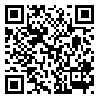Volume 14, Issue 2 (volume14, Issue 1 2020)
2020, 14(2): 95-108 |
Back to browse issues page
Download citation:
BibTeX | RIS | EndNote | Medlars | ProCite | Reference Manager | RefWorks
Send citation to:



BibTeX | RIS | EndNote | Medlars | ProCite | Reference Manager | RefWorks
Send citation to:
Ramezani M, Mohammadkhani S, Hasani J, Akbari M, Hatami M. Psychometric Properties of the Persian Version of the Weight Loss Motivation Questionnaire (WLM-Q) among Overweight and Obese Individuals. Research in psychological health 2020; 14 (2) :95-108
URL: http://rph.khu.ac.ir/article-1-3890-en.html
URL: http://rph.khu.ac.ir/article-1-3890-en.html
1- PhD Candidate of Health Psychology, Department of Clinical Psychology, Faculty of Psychology and Educational Sciences,kharazmi university, Tehran, Iran.
2- Associate Professor, Department of Clinical Psychology, Faculty of Psychology and Educational,Sciences, Kharazmi University, Tehran, Iran. ,mohammadkhani@khu.ac.ir
3- Associate Professor, Department of Clinical Psychology, Faculty of Psychology and Educational,Sciences, Kharazmi University, Tehran, Iran.
4- kharazmi university
2- Associate Professor, Department of Clinical Psychology, Faculty of Psychology and Educational,Sciences, Kharazmi University, Tehran, Iran. ,
3- Associate Professor, Department of Clinical Psychology, Faculty of Psychology and Educational,Sciences, Kharazmi University, Tehran, Iran.
4- kharazmi university
Abstract: (6056 Views)
Over the years, weight loss motivation has been introduced as an important factor in weight loss and its stability. The purpose of the present study was to investigate psychometric properties of the Motivation for Weight Loss Questionnaire (WLM-Q) among overweight and obese Individuals. In this study, the Persian version of the WLM-Q prepared using back-translation was administrated to 453 individuals referring to diet therapy centres in Tehran. The internal consistency of the Persian version of the WLM-Q was assessed via Cronbach’s alpha. Moreover, the factor structure of the scale was assessed using confirmatory and exploratory factor analysis. The results of Cronbach's alpha for the whole scale was 0.82 and for the three extracted factors of health, appearance in relation to others, and appearance in relation to oneself, were 0.86, 0.85 and 0.74 respectively. The results indicated the desirable internal consistency of the scale and its components. The outcome of confirmatory factor analysis supported the factor structure obtained from exploratory factor analysis and the fit indices demonstrated a good model fit. In general, it can be concluded that the Persian version of the WLM-Q has desirable psychometric properties and is a reliable instrument for research and clinical settings.
Type of Study: Research |
Subject:
Special
Received: 2020/11/23 | Accepted: 2021/01/6 | Published: 2021/01/6
Received: 2020/11/23 | Accepted: 2021/01/6 | Published: 2021/01/6
Send email to the article author
| Rights and permissions | |
 | This work is licensed under a Creative Commons Attribution-NonCommercial 4.0 International License. |






